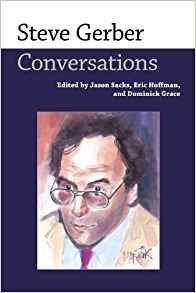Steve Gerber Conversations edited by Jason Sacks, Eric Hoffman and Dominick Grace (book review).
Even if you don’t know comicbook history, you might still have heard of comicbook writer Steve Gerber (1947-2008). Reading the 28 page biography at the start of this book will fill you in if you don’t or missed out details. He was one of the first modern comicbook scriptwriters who chose to address issues and used it in a super-hero medium. Not all time.
After all, I doubt if you would call Man-Thing a super-hero and if you knew fear, risked being burnt by his touch. His run on ‘The Defenders’ weaved a convoluted storyline, more so when Nighthawk’s brain and personality went in different directions. One thing I would correct is that when Chondu is finally returned to a modified body, it is his own body and he was driven insane when he finds out what his fellow Headmen did to him.
Gerber is most well known for his satire and wisemouth creation, Howard The Duck. I still own one of his ‘Howard For President’ badges. Considering his presence in the recent ‘Guardians Of The Galaxy II’ film, you do have to wonder if the world is ready for the Duck this time than in that abortive George Lucas directed 1986 film.
Anyway, as you can gather from the book title, ‘Steve Gerber Conversations’, editors Jason Sacks, Eric Hoffman and Dominick Grace have drawn together 16 interviews from across his career so you can see what he thought about his work and career at different times. Much of it is insightful, showing how although he started off as a comicbook geek it didn’t stop him making observations. A significant one in the first interview conducted by Mark Lerer covering 1976-77 of how Stan Lee changed how super-heroes were written with Spider-Man purely by accident that it also limited others from exploring anything different for a couple decades afterwards.
It’s inevitable with such interview books that the same questions will be asked of old subjects. Some of it is to get the interviewee to relax and then, hopefully, find some questions that haven’t been asked before which, from personal experience, is a lot tougher and you hope might yield some deeper insights. Across these interviews, Gerber often corrected some misconceptions that his ‘interrogators’ have that you have to wonder why it never came out in their original research.
Gerber also frequently sets the record straight, especially on his ‘Stewart The Rat’ graphic novel, a reaction to Disney than to Marvel. It does make me wonder if he would have worked through the other anthropomorphic animals. However, he also points out that there are distinct differences between Howard and Stewart that he would never just change their shape and give them the same voice. Interestingly, with the interview conducted by Peter Sanderson, he reveals Howard’s voice was akin to Burgess Meredith’s voice as the Penguin in the 1960s ‘Batman’.
His insight into how to script animation as opposed to comicbooks should be read if you have ambitions in that quarter. More so, as he sold his first script with that understanding. There are similarities between the two mediums but a difference in flow. At least the restrictions laid down in the 1980s to keep things insipid seems to have changed these days.
I think I can recall reading the David Anthony Kraft interview with Gerber back in the day in Comics Interview # 1. I like the way Gerber explains how kids TV shows, especially animation shows, were made insipid so as not to upset any of various groups out there but also removed anything challenging for kids to get a grip of. Oddly, his fantasy animated series ‘Thundarr’ took note of what wasn’t to be used and took advantage of it.
With the 1986 interview with Dwight Jon Zimmerman, we get insight into the ‘G.I. Joe’ animated series which he story edited and the way the metaphors that got things under the studios and made it successful against the odds for all ages.
It’s rather inevitable that there are some repetitions across the interviews which is more apparent when clumped together although they were done over nearly 40 years. I would suggest you space yourself out when reading the book.
Oddly, the 2002 interview with Martin Shipp for Borderline # 6 seems the more confrontational or at least in the manner of approach to questions although Gerber looked like he was enjoying answering the questions.
The final section has Gerber’s comments on ‘Comics Forums’ over 15 years, the last shortly before his death.
Something that the passage of time since Steve Gerber’s death in 2002 is that checking on-line that most of his comicbook work is now available in some form or another. Oddly, I couldn’t find ‘The Phantom Zone’ initially, but if you look for it as ‘Superman Presents: The Phantom Zone’, up it pops. You should be able to find the rest with ease.
GF Willmetts
June 2019
(pub: University Press Of Mississippi, 2019. 203 page illustrated indexed enlarged paperback. Price: $25.00 (US), £24.50 (UK). ISBN: 978-1-4968-2301-4)
US release: 15 July 2019
UK release: 30 July 2019
check out websites: www.upress.state.ms.us and www.eurospanbookstore.com



